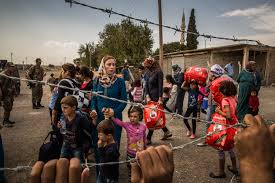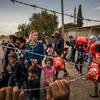clear

source:
No picture
In my view it is ethically questionable to lure Syrian immigrants by prospects of ample social benefits and possible promising career for extra skilled individuals to the West from their cultural, religious and linguistic context. We might patch up some labour shortages by highly qualified staff but the majority will most likely face great difficulties finding their way in the highly specialized and sophisticated economies in the EU. Instead, we should support the neighboring countries that already bear the brunt of millions of Syrian refugees. A common sense assumption says that the further get and the longer stay refugees from their home country the less likely they will return home. Evidently all those skilled and also less skilled people will be needed in the reconstruction of Syria once the conflict is over. Therefore we should not, in part selfishly, invite them to the EU precisely for the sake of Syria's future. In addition we should publicly encourage in every possible forum the rich Gulf states to contribute their share, i.e. to accept temporarily Syrian refugees in their territories where there are practically no cultural, linguistic or religious barriers and to provide funds for improving the situation of refugees already present in Lebanon, Jordan and Turkey.
 2
2
clear
One of the most abhorrent aspects of the war that had displaced millions of Syrians is the fact that the so-called Syrian civil war has become a proxy conflict. Russian warplanes bomb Free Syrian Army (FSA) positions, US jets strafe ISIS convoys, Syrian Army assaults are bolstered by Iranian militia, while FSA fight against regime troops on one front, and Al-Qaeda affiliates on another. It is the very nature of this pitiless war that raises serious ethical questions about accepting war immigrants. The war itself began with fairly unremarkable street protests against the Syrian regime; few Syrians could have anticipated that their country would be so comprehensively dismembered.
Until recently, Syrians were among the most progressive societies in the Middle East. Syria was proud of its status as a melting pot of creeds and cultures. Orthodox Christians married Sunnis; Alawites lived among Druze; Jewish enclaves and Kurdish communities flourished. But the proxy war has turned Shia against Sunni throughout the ruins of its once majestic cities. Centuries of co-existence have been shattered by a few years of mindless bloodletting with scant evidence of any light at the end of the tunnel. As a result, millions of educated civilians have found themselves transformed into refugees.
The world has an obligation to open its arms to those fleeing atrocities being commited by all sides in the conflict. Those neighbouring states who have been supplying arms and volunteers for the warring factions should feel a particular impetus to accept refugees fleeing the fire they have been so responsible for stoking.
 2
2
clear
Way back when Gulf War 2 was happening, I remember a banner that summed up what was happening perfectly: 'How did our oil get under their soil?'. That question cut to the heart of what was going on. The same is true for Syria now.
You probably haven't heard of a company called Genie Energy. They're an oil exploration business. On Genie Energy's Strategic advisory board are Dick Cheney (former vice president of the United States), Rupert Murdoch (media mogul and chairman of News Corp), James Woolsey (former CIA director), Larry Summers (former head of the US Treasury), and Bill Richardson, former Governor of New Mexico, an ex-ambassador to the United Nations and United States Energy Secretary. In other words, some people who are hugely influential in world politics, and what we get to hear about Syria, where they've been doing exploratory oil drilling for some time.
That's what this conflict is about. A whole country is being destroyed to satisfy the west's desire for more oil, so we can maintain our wasteful lifestyles. Syrians are dying, and forced to flee their country, so we can drive our cars to the shops. I think the very least we can do in the circumstances is accept Syrians into wherever we live.
 1
1
clear
From my own perspective, it is unethical not to allow Syrian refugees into near countries. The Syrian people are suffering terribly due to a situation that was certainly exacerbated ,if not caused by reckless invasion of Iraq. To make all Syrians pay because a Syrian was implicated in the Paris terrorist attack it ridiculous. It is trying to kill a gnat with a sledge hammer.
When thinking about the situation of refugees two main considerations should be taken into account. First, refugees, insofar as they are fleeing violence and persecution, have rights to be given domicile in a safe place where they are able to engage in some kind of productive activity. This may not imply that they be given rights wherever they happen to be outside the country from which they are fleeing. But the international community has a duty to cooperate in resettling refugees in a place that is safe and welcoming.
Of course we need to be vigilant in keeping away terrorists . but our screening needs to be much more refined than this! I believe this exclusion is just an excuse to exercise our underlying racism, anti-Islam, and anti-immigrant sentiments. It is certainly a violation of our faith's call to welcome the foreigner and care for the needy.
 0
0
clear
 Wafa Benizid
6 years, 11 months ago
Wafa Benizid
6 years, 11 months ago
No! As much as possible should be done to help people coming from an impossible situation start new lives. I sometimes think that Syrian refugees are somehow thought as not human, because if you had a Syrian friend who emailed you and said "Our road is being bombed, can I come and stay with you for a while?" would you really email them back and say "Oh that's terrible, but sorry, no, because I'm not sure there is room for you in my house, your children can't come to my children's school and certainly you can't get a job here, look you're better off staying where you are. Also, I'd prefer you don't have treatment for any medical problems you might have on the NHS, I paid for that with my taxes and it's all mine." I hope that you wouldn't, you'd do everything you could to give them a hand. It's just the same, but on a larger scale. We should do all we can to help other people, full stop.
 0
0
clear
No, not ethical, but understandable
 0
0
clear
don't confuse migrants (who have a choice) and refugees (who don't have a choice re leaving e.g. due to their country being at war); re refugees, not just unethical to refuse, but also in many cases illegal (only sharing wikipedia link as it's very basic/ accessible viz legalese of full refugee related int'l law): https://en.wikipedia.org/wiki/Convention_Relating_to_the_Status_of_Refugees
 0
0
clear
The question is slightly wrong. There is no ETHICAL question about a country refusing access to a MIGRANT. Migrants can be allowed or refused entry according to the laws of the country concerned.
I think the question refers to REFUGEES.
A refugee is defined in the 1951 Refugee Convention as a person who has a well-founded fear of persecution in their home country. http://www.unhcr.org/pages/49da0e466.html
There are some interesting FAQs here http://www.unhcr.org/en-us/about-us/background/4ec262df9/1951-convention-relating-status-refugees-its-1967-protocol.html
But does living in a war zone count as persecution? I have tried to find out, it is very difficult. The point being that the difference between “migrant” and “refugee” is often blurred. Europe has of course seen many awful wars. If the 1951 Refugee Convention had been in place during WW2, would civilians from occupied Holland, say, have a legal right to be viewed as refugees and therefore be taken in by (neutral) Switzerland? Would it make a difference if they were Jewish? Would civilians be regarded as refugees only when the fighting was going on?
In any case, if living in a war zone counted as being a refugee (I don't know), you can see that Switzerland would have been swamped. What would Switzerland have done in such circumstances?
Now change "Holland" to "Syria, Somalia, Libya.." and "Switzerland" to "European Union, USA..."
Maybe it all depends on numbers? But the potential number of refugees (if the definition fits) is huge - and beyond the abilities of recipient countries to cope?
 0
0
clear

Sign up to post or vote on answers.
Improveo will help systemize your knowledge.

 AdrianR
AdrianR